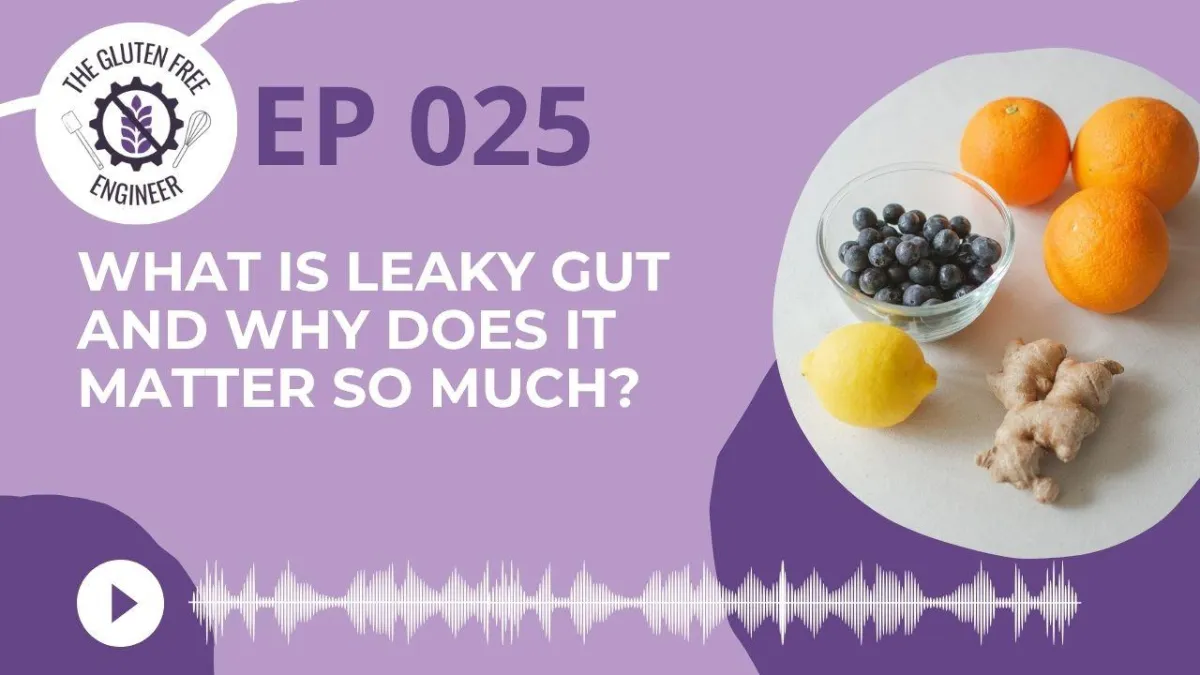
#25: What is Leaky Gut and Why does it Matter so Much?
Have you ever heard the term leaky gut and wondered what it actually means—or if it has anything to do with being gluten-free or having celiac disease?
In today’s episode, we’re diving into the science behind leaky gut, why it's such a hot topic in the gluten-free world, and how it could be impacting your health more than you realize. Whether you’re newly diagnosed with celiac, suspect a gluten sensitivity, or you’ve been gluten-free for a while but still don’t feel 100%, this episode is for you.
We’ll talk about what a leaky gut really is, what causes it, how gluten plays a major role in damaging the gut lining, and—most importantly—what you can do to support your gut healing journey.
What Is Leaky Gut and Why It Matters for Gluten-Free Living
Leaky gut syndrome has become a hot topic in the gluten-free community, and for good reason. But what exactly is a leaky gut, and why should those with celiac disease or gluten sensitivity care about it? As someone who lived with un-diagnosed celiac disease for over three decades, I've experienced firsthand the complex journey of gut healing that extends far beyond simply eliminating gluten from my diet.
Understanding the Gut Lining and How It Becomes “Leaky”
The gut lining serves as our body's crucial barrier—similar to a protective mesh or coffee filter—designed to keep beneficial nutrients in while filtering out harmful substances. When this lining becomes damaged, it develops increased porosity (hence the term "leaky gut"), allowing undigested food particles, toxins, and bacteria to pass into the bloodstream where they don't belong. This permeability can trigger widespread inflammation, alter medication processing, and provoke immune responses to substances your body wouldn't normally react to. Many people with gluten-related conditions experience what resembles arthritis when gluten-derived irritants slip through this damaged barrier, causing their body to "freak out" with inflammatory responses throughout their system.
The Link Between Gluten and Leaky Gut
The connection between gluten and leaky gut is particularly direct in celiac disease, where gluten triggers a specific autoimmune response that attacks and damages the intestinal lining—essentially, your body attacking itself. However, even those with non-celiac gluten sensitivity may experience inflammation that contributes to increased gut permeability. Modern wheat varieties contain significantly higher gluten content than historical versions, potentially overwhelming our digestive systems and gradually damaging gut integrity over time. This explains why some people who have eliminated gluten still experience persistent symptoms: the gut hasn't fully healed from previous damage.
Symptoms of Leaky Gut (and How They Overlap with Gluten Sensitivity)
The symptoms of leaky gut overlap significantly with those of gluten-related disorders:
Digestive issues (bloating, gas, constipation or diarrhea)
Brain fog
Fatigue
Skin problems like eczema
Joint pain
Headaches
Nutrient deficiencies (particularly vitamin D and B vitamins)
Interestingly, many celiac patients notice increased sensitivity to even tiny amounts of gluten after being gluten-free for several months. This isn't a sign that things are getting worse—rather, it indicates your body is healing and becoming more adept at recognizing and responding to gluten as the foreign invader it is.
Strategies to Support Gut Healing
Healing a leaky gut requires a multifaceted approach beyond strict gluten elimination. Focusing on nutrient-dense, anti-inflammatory foods forms the foundation of gut repair. Some of the most helpful foods include:
Bone broth: Rich in collagen and amino acids that support intestinal lining regeneration—especially homemade versions
Leafy greens: Feed beneficial gut bacteria
Berries and wild-caught fish: Provide anti-inflammatory compounds
Fermented foods: Like sauerkraut, kombucha, and non-dairy yogurts (if tolerated)
Supplements: Collagen (I personally use Primal Kitchen brand) may support tissue repair
Avoiding Additional Gut Irritants
Equally important is identifying and eliminating additional gut irritants:
Excess sugar
Alcohol
NSAIDs like ibuprofen
Highly processed foods
Many people with celiac disease or gluten sensitivity develop additional food intolerances—often temporary, sometimes permanent. In my case, I discovered severe reactions to tomatoes and soy, along with various nightshade vegetables and legumes, through structured elimination diets like FODMAP. Working with healthcare providers to explore targeted supplements such as probiotics, digestive enzymes, zinc, or L-glutamine might provide additional support for gut repair.
Don’t Forget Lifestyle Factors
Don't underestimate the impact of lifestyle factors on gut healing. Quality sleep and stress management directly affect the gut's ability to repair itself.
Reducing screen time before bed
Prioritizing 7–8 hours of restorative sleep
Practicing stress management techniques
These steps can significantly enhance healing outcomes. Remember, healing a damaged gut is a gradual process requiring patience and self-compassion—especially for those who lived with undiagnosed celiac for many years.
The Gut-Brain Connection
The gut-brain connection is powerful—recent research confirms the gut functions as our "second brain." This explains why digestive issues often manifest as cognitive symptoms like brain fog and migraines. Taking care of your gut doesn’t just benefit your digestion—it supports your entire well-being.
